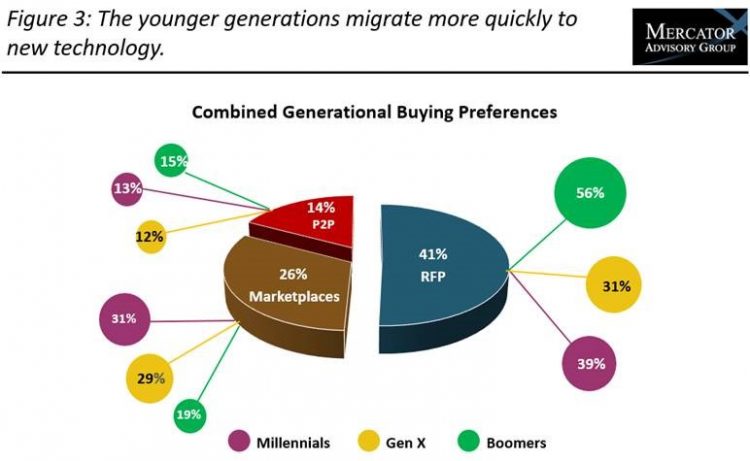In a member report that we released recently titled B2B Marketplaces: Disruption Presents Opportunity, we discussed the profound and logical changes occurring in both the procurement methods and expectations of B2B buyers.
These changes are firmly rooted in several factors. At the highest level is the availability and improvements of e-commerce marketplaces for consumers, which drive the need for similar experiences as people shift into company work mode.
Second is the demographic shift as millennials (and Gen Z following right behind) begin to occupy a majority portion of the workforce, bringing along their own tech preferences (mobile required). We illustrated this in the referenced report.

Sources: Mirakl, Oracle, and WBR Insights, “The Next Generation of B2B Purchasing”
In the referenced blog posted on Practical Ecommerce, the author provides summary findings from a global survey of enterprise sellers in goods and services. So this is the perspective of those doing the selling about what those doing the buying really want and need.
These echo many of the same findings we had when looking over the state of B2B e-commerce:
Manufacturers and distributors know that they need to offer their products online for easy, self-service ordering. But many of those same businesses fear they won’t be able to meet customer expectations….A recent survey from Episerver of 700 business-to-business sellers found that 84 percent believed failing to meet rising customer ecommerce expectations is among the top threats their businesses face in 2019 and beyond….“Like consumers, business buyers expect interactions with companies to be effortless, and don’t care why something doesn’t work the way it should…even if they struggle with the same challenges at their own companies,” wrote the survey’s authors.
In our report, we stressed the fact that many manufacturers and distributors were behind in their adoption of digital sales tactics and platforms. Many will not use the marketplaces in existence and seek more direct models, but have not yet figured out how to exactly do that. The author of the summary goes on to point out several ‘success’ factors that they hear from B2B buyers:
-
Cost savings.B2B shopping is price sensitive. Whether it’s buying auto parts for a chain of repair shops or toys for a retail boutique, price matters. Buyers want to get the best prices for the items they buy. They also want good prices relative to their competitors.
-
Increasing the efficiency of the purchasing process.Ordering, reordering, and adjusting orders take time. If this process is easy and fast, buyers like it.
-
Internal client satisfaction.B2B buyers have internal customers to keep happy. This may be a manufacturing manager, a supervisor, or someone in another department.
The summary is a good, quick read and is also downloadable for those interested.
Overview by Steve Murphy, Director, Commercial and Enterprise Payments Advisory Service at Mercator Advisory Group